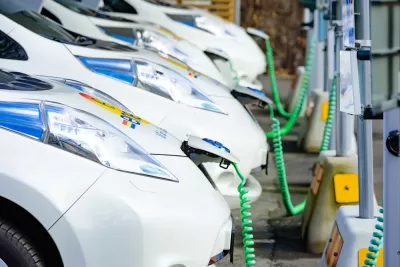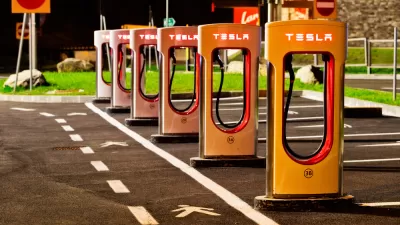While Trump wants to end the EV credit program, in part to punish GM for closing unprofitable car manufacturing plants, Norway is scaling back the generous perks that have enabled EV sales to comprise almost half on new auto sales.

"The Trump administration is already trying to roll back strict fuel-efficiency rules that have helped encourage automakers to produce electric cars," writes Michael Grunwald for POLITICO Magazine on Dec. 23.
Now the president, angry at General Motors for closing U.S. plants, is vowing to eliminate tax credits that have helped encourage consumers to buy electric cars.
[T]he electric vehicle revolution [in the U.S.] is only in its infancy, and Washington could conceivably help strangle it in its cradle. EV sales are up nearly 80 percent this year, but they’re still under 2 percent of all vehicle sales.
On the other side of the pond, another scenario is unfolding for plug-in battery electric vehicles which will mean the loss of some perks, but for very different reasons. Norway, which has achieved the world's highest per capita market for EVs, will begin to scale back some of its generous incentives now that EVs compose 49 percent of new passenger- and light commercial vehicle sales. The percentage is even higher in Oslo, the nation's capital: 57 percent, according to Sture Portvik, manager of electro-mobility for the City of Oslo.
"[A]s the EV market overtakes gas and diesel cars, a question looms about how long the country will be able to continue its lauded incentive programs," writes Tracey Lindeman for CityLab on Dec. 27. "In Oslo, plans to make the downtown core entirely car-free mean the city is starting to roll back some of the freebies it gave to EV owners." [See Streetfilms: "Oslo: The Journey to Car-free."]
In 2020,... Norwegians risk losing one of the most important incentives: the exemption from a 25-percent sales tax (VAT) that saves each EV buyer thousands of dollars.
Municipalities are allowed to introduce some toll, parking, and ferry fees for EVs as a way to regain tax revenue while the fossil market winds down.
According to the Norwegian Electric Vehicle Association, "the Norwegian Parliament have decided on a national goal that all new cars sold by 2025 should be zero emission." A goal is different than a ban, so it will be interesting to see how the loss of perks affects EV sales.
Full perks for fuel cell electric vehicles, which emit only water vapor and heat, will remain "because they haven’t yet crossed over to the mainstream," adds Lindeman.
Related in Planetizen:
-
A Car Ban By Other Means, July 2, 2018: After failing to implement a car ban, Oslo officials are converting downtown street parking into public space.
FULL STORY: Will Norway’s Electric-Vehicle Boom Outlast Its Incentives?

Planetizen Federal Action Tracker
A weekly monitor of how Trump’s orders and actions are impacting planners and planning in America.

Map: Where Senate Republicans Want to Sell Your Public Lands
For public land advocates, the Senate Republicans’ proposal to sell millions of acres of public land in the West is “the biggest fight of their careers.”

Restaurant Patios Were a Pandemic Win — Why Were They so Hard to Keep?
Social distancing requirements and changes in travel patterns prompted cities to pilot new uses for street and sidewalk space. Then it got complicated.

Platform Pilsner: Vancouver Transit Agency Releases... a Beer?
TransLink will receive a portion of every sale of the four-pack.

Toronto Weighs Cheaper Transit, Parking Hikes for Major Events
Special event rates would take effect during large festivals, sports games and concerts to ‘discourage driving, manage congestion and free up space for transit.”

Berlin to Consider Car-Free Zone Larger Than Manhattan
The area bound by the 22-mile Ringbahn would still allow 12 uses of a private automobile per year per person, and several other exemptions.
Urban Design for Planners 1: Software Tools
This six-course series explores essential urban design concepts using open source software and equips planners with the tools they need to participate fully in the urban design process.
Planning for Universal Design
Learn the tools for implementing Universal Design in planning regulations.
Heyer Gruel & Associates PA
JM Goldson LLC
Custer County Colorado
City of Camden Redevelopment Agency
City of Astoria
Transportation Research & Education Center (TREC) at Portland State University
Camden Redevelopment Agency
City of Claremont
Municipality of Princeton (NJ)



























